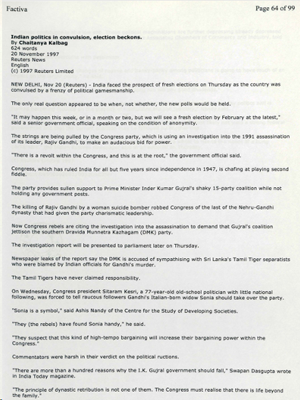Indian politics in convulsion, election beckons
[Reuters]
Published date: 20th Nov 1997
20 November 1997
Reuters News
English
(c) 1997 Reuters Limited
NEW DELHI, Nov 20 (Reuters) – India faced the prospect of fresh elections on Thursday as the country was convulsed by a frenzy of political gamesmanship.
The only real question appeared to be when, not whether, the new polls would be held.
“It may happen this week, or in a month or two, but we will see a fresh election by February at the latest,” said a senior government official, speaking on the condition of anonymity.
The strings are being pulled by the Congress party, which is using an investigation into the 1991 assassination of its leader, Rajiv Gandhi, to make an audacious bid for power.
“There is a revolt within the Congress, and this is at the root,” the government official said.
Congress, which has ruled India for all but five years since independence in 1947, is chafing at playing second fiddle.
The party provides sullen support to Prime Minister Inder Kumar Gujral’s shaky 15-party coalition while not holding any government posts.
The killing of Rajiv Gandhi by a woman suicide bomber robbed Congress of the last of the Nehru-Gandhi dynasty that had given the party charismatic leadership.
Now Congress rebels are citing the investigation into the assassination to demand that Gujral’s coalition jettison the southern Dravida Munnetra Kazhagam (DMK) party.
The investigation report will be presented to parliament later on Thursday.
Newspaper leaks of the report say the DMK is accused of sympathising with Sri Lanka’s Tamil Tiger separatists who were blamed by Indian officials for Gandhi’s murder.
The Tamil Tigers have never claimed responsibility.
On Wednesday, Congress president Sitaram Kesri, a 77-year-old old-school politician with little national following, was forced to tell raucous followers Gandhi’s Italian-born widow Sonia should take over the party.
“Sonia is a symbol,” said Ashis Nandy of the Centre for the Study of Developing Societies.
“They (the rebels) have found Sonia handy,” he said.
“They suspect that this kind of high-tempo bargaining will increase their bargaining power within the Congress.”
Commentators were harsh in their verdict on the political ructions.
“There are more than a hundred reasons why the I.K. Gujral government should fall,” Swapan Dasgupta wrote in India Today magazine.
“The principle of dynastic retribution is not one of them. The Congress must realise that there is life beyond the family.”
The turmoil is hurting India’s economy, which has largely withstood turbulence in other parts of Asia but is struggling to achieve ambitious growth targets.
The Bombay stock index has fallen five percent in four days on the political uncertainty
“Business confidence is at a low ebb. These political machinations are further depressing already depressed sentiment,” V. Raghuraman, secretary-general of the Associated Chambers of Commerce and Industry, told Reuters.
But Nandy is not overcome with pessimism.
“I don’t think these quick changes of regime and hanky-panky among politicians is going to have much of an impact on the larger polity,” he said.
“There is a social churning going on which in the long run will pay good dividends.”
“Over the past 10 years Indian politics has begun to reduce the importance of day to day politics and is instead becoming focused on the stability of institutions like the judiciary,” Nandy said.
There is unanimity among politicians of all hues that a new election will most likely not yield a strong federal government and that the current coalition may be followed by another one.
“The present crisis is a pointer to failure of the political crisis as a whole to rise to the needs of a hung parliament,” the Indian Express newspaper said in an editorial on Thursday.
(c) Reuters Limited 1997






